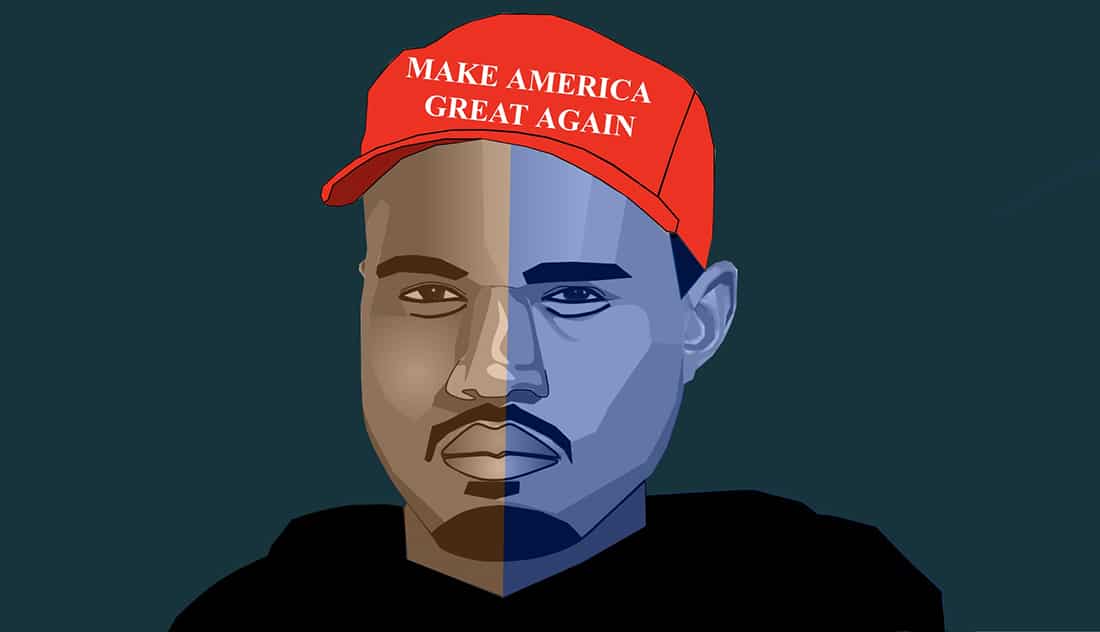Criticism, support, general coverage — unless you live under a rock, you’ve heard the name Kanye West this week. West met with President Donald Trump Oct. 11 and spoke about the problems with the 13th amendment, North Korea, his false bipolar diagnosis, his support for the 2nd amendment, making Trump look good and “the Yeezy effect.” During his set on Saturday Night Live (SNL) Sept. 29, West danced around dressed as a Perrier sparkling water bottle and criticized the general public for being leftist bullies and attacking Trump, all while wearing a Make America Great Again hat.
We need to decline to engage with the media surrounding this man. It’s not our place as media spectators to intervene as long as West seeks out the spotlight. Instead, we have an obligation to consider how we interact with his content — instead of obsessively discussing and sharing every opinion we have on West’s antics, we can appreciate him as a musician and critique him with deliberation and thought.
West is seeking attention through radicalism while living in a world of fame and exuberance severed from the one the rest of us live in. Kanye has a long history of being in the press. In case you forgot: he rapped that he and Taylor Swift “might still have sex” because he made “that b**** famous,” referencing his controversial coup of her 2009 VMA Best Album award. Last May, West said that slavery sounded like “a choice,” and called for an abolition of the 13th amendment, though he later explained that he was trying to argue against the prison-industrial complex. He requested that Louis C.K. who has admitted to sexual misconduct, host SNL. He has worked with now deceased XXXtencion, famously accused of domestic abuse. He went to Detroit’s College for Creative Studies Oct. 2, jumped on a table and yelled at students there to leave Elon Musk alone. He’s also an outspoken Trump supporter, saying that Trump is the “freshest, the flyest.”
As a fan, it’s hard to understand the current West. This is the same man that wrote a musical ode to his mother, rapped about how poor people in his community needed to deal drugs to survive and criticized George W. Bush for not caring about black people (Kanye has since rescinded this comment on George Bush because he made the comments while in a “victimized … welfare mentality.” West’s earlier music touched on poverty, family values, self-consciousness and materialism. It’s hard to ignore his musical talent — West has consistently released popular albums for more than a decade with all 10 of his studio and collaborative albums reaching U.S. top charts. His music portrays the extremes of the human experience — from pain and mania to elation and joy. I will not stop listening to his music, but I’ve made the choice to disentangle myself from the opulence and irrationally of his public persona.
According to scholars at the University of British Columbia, the constant exposure and relentless attention from fame have a correlation with mental illness. Celebrities like West either are thrown into or intentionally join the media feeding frenzy that consumes this country — they are chewed up, digested and spat back onto the pavement for our entertainment. It’s not realistic for West to change his behavior: it’s on us to stop engaging with the obsessive attention we give him. West is just an artist that happens to be in the public eye; he has no obligation to act the way we want him to. Instead of documenting his every move, writing insensitive articles and sharing memes about West, we as fans can appreciate him as an artist while rationally discussing and criticizing his actions.
America is both cheering and booing as Kanye descends into his “sunken place.” We’ve seen this countless times before: the rise of a charismatic figure and their fall from fame and constant media attention. Think about Michael Jackson dangling a baby from his hotel balcony, Britney Spears publicly shaving her head, Justin Bieber hitting a paparazzo with his car — it’s clear that the publicity we create has dangerous consequences.
Celebrities and public figures become toys for our amusement in the public eye. We seek their antics out on the news, discuss them with our friends and family (my dad, who normally doesn’t follow celebrity news, shared his own opinions about West’s SNL set last week) and give them inordinate amounts of attention. Our compulsive and constant discussion of them, critical or otherwise, does not hold them accountable for their wrongdoings — it grants them more fame. If constant criticism from the media held people accountable, our president would not be in office. Let us not engage with public figures in a way that is unproductive and hectic. It is time to give Kanye (and others) a break from glory — it is not helpful to him or us to engage with his spiral into darkness.
Oona Milliken is an undeclared first year. She can be reached at omilliken@oxy.edu.
![]()































